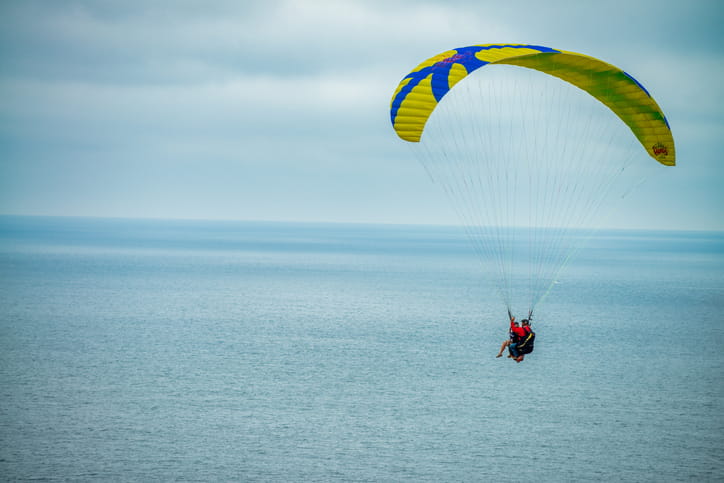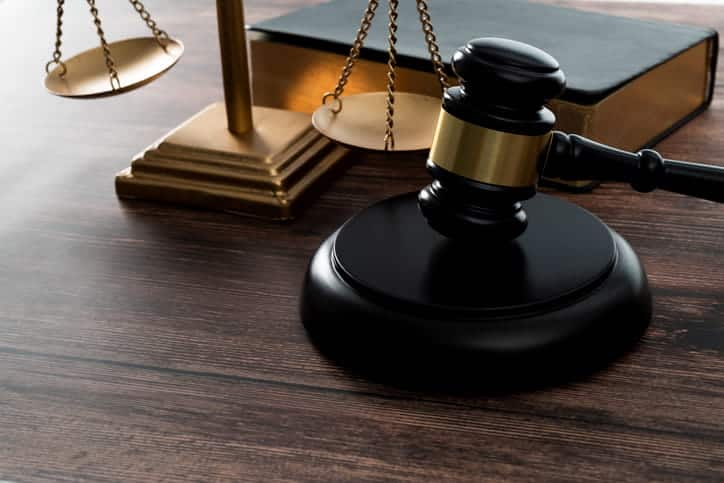Parasailing Accidents: What You Need to Know
Parasailing is a popular recreational activity occurring over land or water. Cars and trucks can power parasails over land, but recreational parasailing is mainly considered a water-related sport.

Today, many parasails feature a seat suspended from a parasail wing, similar to a parachute, pulled into the air behind a boat. Depending on the design, parasails can hold two, three, or five people. Gondola-style seating allows larger groups to parasail together. Parasailing is also called parakiting and paraskiing.
How Parasailing Got Its Start
Parasailing’s origins date back to the 1960s, when cars and trucks towed an early variation of a parasail on beaches to teach military pilots how to use a parachute. Sport parachuters also used the towable parasail wings for recreational purposes. By 1969, people were paying to fly in parasails with body harnesses.
Parasailing Today
The National Transportation Safety Board (NTSB) estimates up to 5 million people parasail each year despite parasailing’s classification as an extreme sport. Understanding parasailing-related safety issues and ways to protect yourself can help you decide whether parasailing is right for you and what to do if you’re in a parasailing accident.
NO FEES UNLESS WE WIN
Protecting Your Rights Since 1983
Were you involved in a parasailing accident and are dealing with injuries?
Hablamos Español
Is Parasailing Safe?
Participating in any sport involves risk, but parasailing involves sailing at extreme heights, and parasailers cannot maneuver the parasail or adjust their flight conditions. Consequently, the NTSB notes parasailing accidents are more likely to cause fatalities or severe injuries.
The NTSB also notes parasailing is a largely unregulated industry. While federal regulations could reduce the frequency of parasailing accidents, the Parasail Safety Council maintains that parasailing is usually safe. Still, the Parasail Safety Council recommends parasailers take safety precautions before parasailing to reduce the risks of injury.
Florida’s Parasailing Laws
Florida’s climate and lengthy shoreline make it a prime venue for parasailing. The number of deaths and injuries from parasailing accidents prompted lawmakers to pass the White-Miskell Act in 2014. The White-Miskell Act establishes clear legal guidelines that must be met for parasailing companies to operate.
Insurance
Parasailing companies must carry insurance. The law establishes minimums per claim, ensuring parasailing companies have the financial means to compensate accident victims.
Licensing
The White-Miskell Act requires all parasailing companies to meet the licensing requirements and obtain a parasailing license before offering parasailing to clients. The United States Coast Guard issues these licenses. The boat operator’s license must be current, and operators must carry it when working.
Conditions for Operation
It isn’t possible to control the weather. Still, the White-Miskell Act attempts to ensure weather isn’t a factor in parasailing accidents by prohibiting parasailing companies from operating under unsafe weather conditions. High winds and wind gusts are grounds to suspend operations, and all parasailing operators must maintain a weather log.
The White-Miskell Act identifies equipment parasailing operators must have on board to operate legally, such as a marine VHF radio, which allows them to hear weather reports from the National Weather Service. In addition to this radio, the operator must have a second electronic device capable of accessing National Weather Service broadcasts to ensure the operator has access to current weather reports.
Safety Risks Associated With Parasailing
Sportscasting.com says parasailing doesn’t make the top 15 most dangerous sports. Although many other sports are considered more dangerous, these significant safety risks are associated with parasailing:
- High winds: Wind gusts can blow parasails off course and put extra strain on the line, causing an accident
- Emergency water landings: High winds and equipment issues can prompt emergency landings. A high-speed impact with water can cause injuries such as broken bones or concussions.
- Damaged chutes: It’s possible to lose control of the parasail if the chute is damaged. Damaged chutes may cause emergency landings.
- Defective harnesses: Defective harnesses may fail to secure passengers to the parasail, causing them to fall
- High-speed landings: High-speed landings increase the force of impact, causing injuries
- Broken lines: A line attaches the parasail to the vehicle supplying the power. A broken line detaches the parasail, leaving parasailers without power or control.
- Popped lines: The line connecting the parasail and the vehicle can go slack if there’s a lull in the wind or power from the car or boat. Passengers may suffer injuries if a change in conditions causes the line to tighten abruptly.
- Storms: Failing to monitor weather conditions can lead to weather-related accidents. High winds and lightning strikes pose severe risks to parasailers.
- Impact with objects: A severed or popped line can cause parasails to veer off course. Operator error can also contribute to collisions with other airborne crafts or buildings.
Parasailing Accident Statistics
Parasailing is popular in the United States, with up to 5 million people engaging in this activity annually. As of 2013, there had been 79 fatalities from an estimated 141 million parasailing rides since the activity’s introduction, which means fatalities occurred in a fraction of a percent of rides given. Only 520 people required hospitalization from the 141 million rides as of 2013, which is also a fraction of a percent of all rides given.
Parasailing accidents may not be daily occurrences, but injuries from parasailing accidents are typically severe. Most deaths occur because riders can’t free themselves from their harness in unplanned water landings, which can result in drowning. Severe injuries can also occur if riders collide with buildings or other objects.
Avoiding Parasailing Accidents
Although there’s always a risk of an accident when engaging in an activity like parasailing, there are things you can do to mitigate the risks and prevent parasailing accidents. Ways to avoid parasailing accidents include the following:
- Choose a reputable company: The company should readily provide critical information, including their name, contact details, cost of services, company history, customer reviews, and safety procedures. Choose a company that also provides videos and photos of their activities. Look for companies that offer operational transparency because this means they have nothing to hide.
- Consider your comfort level: When parasailing, you should wear a secure harness and a helmet. Your boat operator should explain every step of the process and the safety protocols. If you’re getting ready to go out on the water and the operator doesn’t explain the safety protocols, that’s a good reason to cancel your plans. Responsible companies take the time and effort to ensure their clients have a safe parasailing experience.
- Run weather checks: Don’t rely on the companies to monitor the weather. Although they’re legally required to suspend operations when there are sustained high winds or significant wind gusts, some companies may take risks. Paying attention to the weather reports ensures you aren’t in a dangerous situation.
- Research the company: Make sure you read client reviews and look for client reviews on and off the company’s website. Doing a web search on the company and the operators can confirm if there have been prior safety issues.
Who Is Responsible for a Parasailing Accident?
You may wonder how to determine who’s responsible after a parasailing accident and what you need to know before you can consult an attorney. You do not need to know who was responsible or have all the details and evidence to support your claim. Your legal team will investigate and gather evidence to determine who’s responsible.
Responsibility depends on the accident’s cause and actions taken to prevent accidents. Suppose the boat operator knows there’s a recall on the winch. The winch connects the towline to the boat at one end, and the other end of the towline connects to the riders, which is why the winch is a crucial piece of equipment. However, the operator doesn’t want to lose business waiting for the winch to be replaced, so they don’t follow up on the recall. Suppose issues with the winch cause the towline to separate from the boat. In that case, the boat operator is responsible for any injuries. However, suppose the winch motor was faulty. The winch manufacturers knew this and knew there was a risk of motor failure during operation but didn’t issue a recall or warning. The motor failed, causing an accident. In this case, the manufacturers may be responsible.
There are also many reasons for harness malfunctions, which could affect who’s responsible for accident injuries. A manufacturer may be liable for defective equipment, or a boat operator may be liable for failing to inspect and maintain harnesses or ensure they’re properly secured.
Your parasailing attorney has the resources needed to subpoena company records and depose witnesses to ensure they identify who’s responsible for your accident injuries.
What To Do if You Get Injured in a Parasailing Accident
It’s important to know what to do if you get injured in an accident. To fully recover after an accident, you may need to seek legal representation to ensure all damages are addressed and properly compensated for. Here are the important steps you should take:
- Get medical help or call 911
- Get names and numbers of witnesses or anyone else involved
- Write down what happened and take photos
- Notify law enforcement
- Contact your insurance company
- Talk to a lawyer
How an Attorney Can Help
Ensure you make sound medical and financial decisions after an accident by consulting an attorney right away. It’s natural to be in shock and not know what to do. Personal injury attorneys have specialized training and experience that equips them to evaluate the merits of a legal case after a parasailing accident. Here’s how they can help:
- Utilize expert resources to investigate and access information relevant to your case
- Subpoena maintenance records to determine if the company’s negligence contributed to your accident
- Provide information about disability benefits and other financial options you can pursue while waiting to resolve a lawsuit
- Fight to get you comprehensive medical treatment and take recommended medical tests
- Get the maximum compensation for your injuries
You may not comprehend the extent of your injuries immediately. Consequently, whether you’ve been in a Miami parasailing accident or injured while parasailing in Key West, you must take time to have a proper medical evaluation to rule out whiplash and other injuries with delayed symptoms.
Hiring a lawyer ensures you protect your rights and avoid statements or actions that mitigate the at-fault party’s responsibility for your accident.
What To Look For When Choosing a Lawyer

Hiring a personal injury lawyer is the best way to protect your rights after a parasailing accident. Personal injury lawyers provide expert legal counsel for many accidents, including boating accidents and parasailing accidents. Their training involves studying existing case law concerning these accidents, and their familiarity with these case types enables them to locate and use existing case law to support your claim. This is why you should look for a personal injury attorney with experience with parasailing accidents.
Injury attorneys offer free consultations and charge contingency fees, so you don’t have to pay any legal fees until you receive a settlement from your claim. Since you don’t have to pay for a consultation, you can speak to an attorney and ensure you’re comfortable with them and their approach. You may have to share personal details about your injuries with your attorney, so you must feel comfortable discussing your case with them.
The law firm’s size is another consideration when choosing a lawyer. Giant firms may feel impersonal and have large clients commanding most of their resources. Small firms are highly motivated to win every case. Still, they may take longer to investigate accidents because they don’t have the staffing for multiple or complex investigations. Mid-sized law firms usually have more resources than small firms. Firm size is just one of the factors to consider, and meeting with your potential attorney in person allows you to ensure they’re focused on your case and will deliver the personalized care and attention your claim deserves.
Legal Guidance About Compensation
When you choose an attorney, you’re choosing a legal advocate. Your attorney will investigate your accident and fight for you to receive compensation for your parasailing accident injury. Your Miami, Florida, attorney will encourage you to save relevant documentation and help assess your grounds for compensation so you get all the damages you deserve.
Your attorney will help you calculate economic damages, which cover calculable costs for things such as:
- Child care
- Job retraining
- Lost income
- Medical bills
- Transportation costs
Your attorney will also help you determine grounds for non-economic damages, which provide compensation for things such as:
- Anxiety
- Depression
- Grief
- Loss of intimacy
- Pain and suffering
- Post-traumatic stress disorder
Your attorney will also seek punitive damages if your case has grounds to warrant these damages. Proving a personal injury claim involves demonstrating someone’s negligence caused or contributed to your accident. With punitive damages, your attorney must demonstrate the at-fault party was guilty of gross negligence. Gross negligence involves callous disregard for the safety of others and taking deliberate actions despite knowing those actions put others at risk.
Your attorney will determine if you can seek punitive damages, how much you can seek, and how doing so could affect your settlement negotiations.
NO FEES UNLESS WE WIN
Protecting Your Rights Since 1983
Were you involved in a parasailing accident and are dealing with injuries?
Hablamos Español
FAQs
What Are the Most Common Injuries in Parasailing?
Contusions are one of the most common injuries stemming from a parasailing accident. Traumatic brain injuries (TBIs) and broken bones are other common injuries. Severe parasailing accidents can cause death.
How Common Are Parasailing Accidents?
The Parasail Safety Council reports that, out of an estimated 141 million rides in harness parasails, there were 1,365 minor injuries, 520 severe injuries, and 79 fatalities. When combined, these figures represent less than one one-hundredth of one percent.
What Happens if You Fall While Parasailing?
Striking water at high speeds can cause significant injuries, including broken bones or concussions. A person knocked unconscious before or during their impact could drown. It’s also possible for parasailers to fall onto other crafts or people.
What Are the Dangers of Parasailing?
Parasailing dangers include striking the water, structures, or other aircraft at high speeds. Faulty equipment, operator error, and weather also pose risks to parasailers.
Sources:
Consumer Parasail Safety Tips.
McCulloh, M. (2013). An in-depth study looks at the composition of fatal parasail accidents.
About the Author

Jack G. Bernstein, ESQ.
Jack Bernstein is a hard-working and highly motivated personal injury attorney in Miami, Florida with over three decades of experience. He is a strategist and idea person, with a genuine passion for helping his firm’s clients. If you’ve been injured, contact Jack Bernstein today for a free evaluation of your case.
